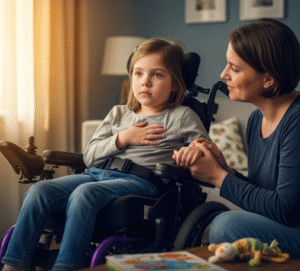Overview
Acoustic neuroma, also known as vestibular schwannoma, is a rare, non-cancerous tumor that develops on the vestibulocochlear nerve—the nerve that connects the inner ear to the brain. This nerve is responsible for hearing and balance, and when a tumor grows on it, it can cause hearing loss, imbalance, ringing in the ears (tinnitus), and, in some cases, pressure on nearby brain structures. Although usually slow-growing, early detection is vital to prevent complications and preserve nerve function.
What is Acoustic Neuroma?
Acoustic neuroma is a benign (noncancerous) tumor that originates from Schwann cells, which are responsible for the insulation of nerves. It primarily affects the eighth cranial nerve, which carries sound and balance information from the inner ear to the brain. As the tumor grows, it can compress nearby nerves and brain tissue, leading to more severe symptoms.
Most cases are unilateral (affecting one ear), but bilateral acoustic neuromas can occur in people with neurofibromatosis type II (NF2), a genetic disorder.
Symptoms
Acoustic neuromas typically develop slowly, and symptoms may take years to appear. Common signs include:
- Gradual hearing loss in one ear (most common symptom)
- Tinnitus (ringing or buzzing in the affected ear)
- Loss of balance or unsteadiness
- Dizziness or vertigo
- Fullness or pressure in the ear
- Facial numbness, tingling, or weakness (if the tumor affects the facial nerve)
- Headaches (in larger tumors)
- Double vision or trouble swallowing (rare, in advanced cases)
Causes
The exact cause of most acoustic neuromas is unknown. However, a known cause includes:
- Genetic mutation in the NF2 gene, which normally helps regulate Schwann cell growth. Mutation leads to uncontrolled cell growth.
- Most people with acoustic neuroma do not have a family history, but those with neurofibromatosis type II inherit a defective NF2 gene.
Risk Factors
- Neurofibromatosis Type II (NF2): A hereditary condition that causes multiple tumors of the nervous system, including bilateral acoustic neuromas.
- Family history of NF2
- Exposure to high doses of radiation to the head or neck during childhood (rare)
Complications
If left untreated, an acoustic neuroma can lead to:
- Permanent hearing loss
- Facial weakness or paralysis
- Persistent imbalance
- Hydrocephalus: Buildup of fluid in the brain due to pressure on brainstem
- Brainstem compression, which can be life-threatening in rare, severe cases
Prevention
There is no known way to prevent most cases of acoustic neuroma. However, for individuals with a family history of NF2, genetic counseling and early screening may help detect tumors before symptoms develop.
- Regular hearing tests if at high risk
- MRI scans for early detection in genetically predisposed individuals
Treatment Options Korea
1. Observation (“Watch and Wait”)
- For small tumors with mild or no symptoms, especially in older adults.
- Periodic MRI scans and hearing tests to monitor growth.
2. Surgical Removal
- Common treatment for larger tumors or growing masses.
- Several approaches depending on tumor size and hearing status:
- Translabyrinthine: Hearing is sacrificed; best for larger tumors.
- Retrosigmoid: Potential hearing preservation; allows access to brainstem.
- Middle fossa: Best for small tumors with good hearing.
3. Radiation Therapy
- Stereotactic radiosurgery (e.g., Gamma Knife): Delivers focused radiation to halt tumor growth.
- Option for small to medium-sized tumors or those who can’t undergo surgery.
4. Rehabilitation and Supportive Care
- Hearing aids or cochlear implants
- Balance therapy and physical therapy
- Facial nerve therapy if weakness occurs post-surgery
- Counseling for emotional and lifestyle support













